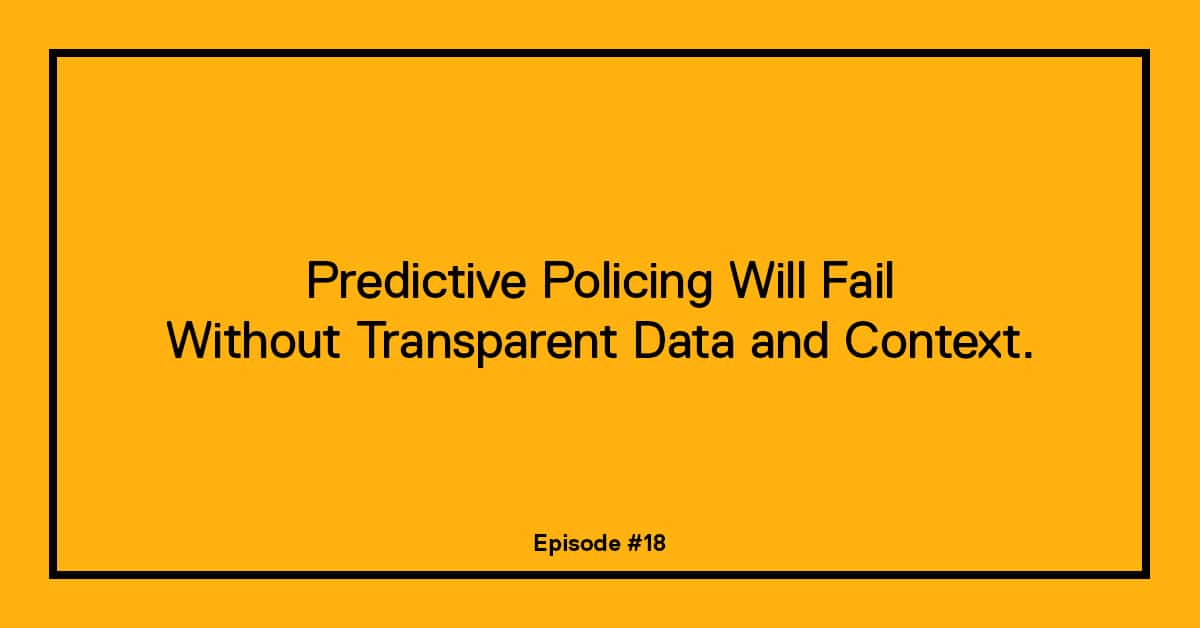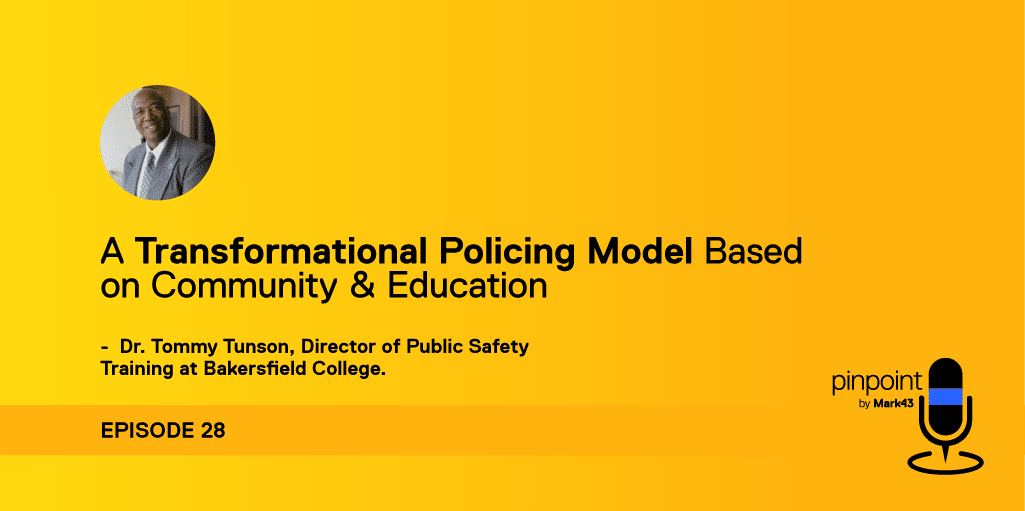Ep 18: Predictive Policing Will Fail Without Transparent Data and Context w/ Professor Jerry Ratcliffe
Kristen Goode | 15 August 2019 | 4 minute read

There were 114 officer suicides this year.
Which is a horrible, tragic number, but not–and this is important–statistically worse than average for the general population.
See, without context, data doesn’t mean anything.
On a recent episode of Pinpoint, I got to interview Jerry Ratcliffe, a professor with the Department of Criminal Justice at Temple University, who has led studies regarding smart policing and authored over 80 research articles and six books.
Professor Ratliffe ran away from home to join the Metropolitan police at age 17. During his career break for college, he snapped his femur in half and ended his policing career, opted for a Ph.D. in spatial and temporal crime analysis techniques, and has been going strong in academics ever since.
We talked about a slew of things in predictive policing from a data-driven, academic perspective.
“So much of policing is geographical by nature,” said Professor Ratcliffe. “In the last 20 years, I’ve seen a massive increase in research on policing because so much of it is spatial.”
(function() { var qs, js, q, s, d = document, gi = d.getElementById, ce = d.createElement, gt = d.getElementsByTagName, id = 'soun_der', b = 'https://embed.sounder.fm'; if (!gi.call(d, id)) { js = ce.call(d, 'script'); js.id = id; js.src = b + '/embed.js'; q = gt.call(d, 'script')[0]; q.parentNode.insertBefore(js, q);}})();
<“Opportunity is the cause of crime.” —Jerry Ratcliffe>
Technology Advances, But Users Stay the Same
Back in the 1990s, some of the software Professor Ratcliffe wanted to use didn’t exist, so he wrote it himself.
“Nowadays, it’s easy to run software programs that do all sorts of stuff, but there are very little markers on whether it’s the right thing to do and whether the data you have is appropriate for it,” he said.
These new challenges mean that while everyone has access to software, they may not know how to use it appropriately.
“Software has made everything easy, but that doesn’t mean that that’s increased our understanding that much,” he said.
On the other hand, social media has made it easy to feel outraged at clickbait.
“Everybody’s their own buzzfeed at this point,” Professor Ratcliffe quipped. “Here are 10 things that I want you to be outraged about.”
He pointed out that particularly statistics and data are quoted without context.
Data without context, like the 114 officer suicides, is just meaningless outrage.
“You only really understand what a number means when you compare that number to something else,” he said.
<“Nowadays, it’s easy to run software programs, but there are very little markers on whether it’s the right thing to do and whether the data you have is appropriate for it.” —Jerry Ratcliffe>
Evidence-Based Policing
The goal of community policing is crime reduction. The headlines make it sound like the initiative is doing a lot of good.
“There are things that we invest time and energy and effort in that don’t necessarily work,” Professor Ratcliffe said. “Sometimes we can reduce crime, and sometimes we may not be as successful as we hope.”
When you unpack the data, community policing doesn’t actually reduce crime.
This is evidence-based policing.
“At the very least, we start to identify what doesn’t work and what does. The key to that is that we need to be investing more time in the things that work,” he added.
Professor Ratcliffe suggested two evidence-based ways that policing could be improved.
Avoid Resource Constraint
After you’ve identified and defined successes, make the goals–and the endpoint–clear.
If you form a squad, you need to define when it has met its goal. Otherwise, “That’s just taken up seven of your very important resources with no clear metric as to when they’re to be disbanded,” he said.
Without going back to review the figures once you’re out of crisis mode, you’re losing resources that get “stuck” in tasks that have grown less important.
“Police departments around the world have taken on more and more and more jobs without shedding some of the jobs that they are unable to do well or pulling resources from the things that are ineffective,” Professor Ratcliffe said.
Maximize Strategic Thinking
Police officers are great at taking charge and making tactical decisions on the ground. “What’s often lacking is the level of strategic thinking behind it,” Professor Ratcliffe said.
Foot patrol officers assigned to crime hotspots, for example, are a wonderful resource for learning about some of the deeper problems. They’re gaining community intelligence.
“We try to tactically deal by putting the fire out, and we never actually address the underlying reason why there was constantly a fire at that location,” Professor Ratcliffe said.
<“You only really understand what a number means when you compare that number to something else.” —Jerry Ratcliffe>
Context Matters
Professor Ratcliffe concluded by mentioning three assumptions about policing that become meaningful in context.
1.Risk factors for crime aren’t crime.
If you take two communities with high unemployment and drugs, one might be a crime hotspot and the other isn’t.
“You can see whole swathes of neighborhoods that suffer the same kinds of problems, yet within that you only have a few crime hotspots. It’s because those locations have greater opportunity. Opportunity is the cause of crime,” he said.
- Policing is inherently biased.
Predictive policing is ideally based on accurate data, but crime data isn’t always accurate. It could be underreported or biased towards or away from neighborhoods.
“The flaws in these arguments start to become really apparent very quickly, but that doesn’t mean they’re not getting picked up by clickbait,” Professor Ratcliffe said.
Data transparency will be the main solution for this problem.
- Context matters.
We can decide what we would like to include in an algorithm. We can decide when to use predictive policing and to what extent.
=“We can have discussions about and we can talk about what data go into predictive policing and what they do. That is, I would argue, much more democratic,” he said.
To hear more from Professor Ratcliffe, follow him on Twitter @jerry_ratcliffe, listen to the Reducing Crime podcast, or read one of his books.
This post is based on a Pinpoint podcast with Professor Jerry Ratcliffe. To hear this episode and many more like it, you can subscribe to Pinpoint here.
If you don’t use iTunes, you can find all our episodes here.




